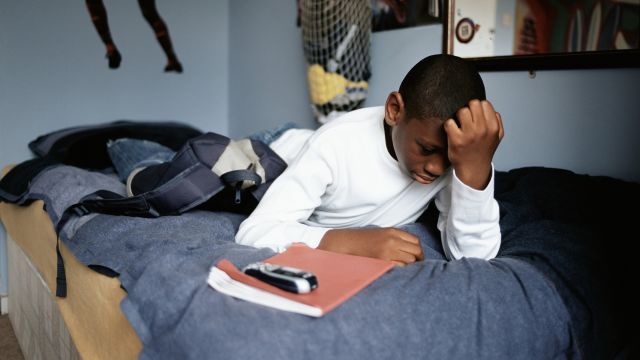It’s back to school season, with students (and parents) saying goodbye to the freewheeling days of summer and returning to the structure of the academic year. The school routine typically includes early mornings and, often, late nights of homework and studying.
For students, there is increasing pressure to perform well academically, especially as they enter high school and college is on the horizon. Academic workloads increase, and so do time commitments to other extracurricular activities, including sports. It can be a real challenge to find enough time for all of this activity, and it’s not hard to see how bedtime gets pushed back later and later, to make room for studying.
It might seem like a reasonable sacrifice to give up a little sleep to hit the books late into the night, but new researchsays this strategy doesn’t work. This study found that students who stay up late doing homework are more likely to have academic problems the next day. This is true regardless of how much overall studying the student does, according to the study results.
Researchers at UCLA examined the daily sleep and study habits of 535 students in grades 9, 10, and 12. All the studentswere enrolled in Los Angeles schools, and represented a range of socioeconomic and ethnic groups. For two weeks, students kept diaries recording their daily study amounts and sleep amounts. They also kept track of two different types of academic problems:
- Having trouble understanding material being taught in class
- Doing poorly on tests, quizzes, or homework assignments
Researchers found that opting to delay bedtime in favor of studying was linked to an increased risk of both types of academic difficulty. And this was true regardless of the total amount of students’ study time.
The remedy to this problem is not to study less, but rather to create a schedule that allows for sufficient study time and sufficient sleep time. Is that easier said than done? Probably. But as these results indicate, extra study time at the expense of sleep is like to create academic problems, not solve them. And students who regularly stay up late are exposed to other risks of low sleep. Here’s some of what we know about how insufficient sleep can negatively affect teens:
- Teens who don’t get enough sleep are more likely to engage in risky and unhealthful behaviors. This study found low sleep linked to increased likelihood of smoking, drinking, drug use, and fighting, among other risky behaviors.
- Teens who sleep less are more likely to gain weight. We know that low sleep is associated with weight gain, in children as well as adults. This study found that teens who sleep less are more likely to consume more total calories in a day, as well as to eat higher fat foods and more snack foods than teens who get enough sleep.
- Teens who are short on sleep are more likely to feel depressed and anxious. There’s substantial evidence that teens with sleep problems are at higher risk for mental health and behavioral problems. This National Sleep Foundation survey found that teens short on sleep were significantly more likely to experience depression, stress, excessive worrying, and anxiety.
Teenagers, as any parent knows, are predisposed to staying up late and sleeping late, which complicates things even further. This is a biological reality, not just a teenage preference! It’s not always easy to manage a teenager’s sleep schedule. Here are some strategies that can help:
Keep technology out of the bedroom. Electronic and digital devices have no place in the bedroom. Exposure to the light emitted by these devices is disruptive to sleep, and their presence at bedtime can keep teens awake—or even keep them engaged in activity while they are asleep!
Work backward to find the right bedtime. Teens need more sleep than adults, about 9 hours per night. To find the appropriate bedtime, start by identifying what time your teen needs to be rising from bed. From there, work backward to set the bedtime that will ensure your teenager gets enough rest.
Let them sleep in a little on the weekends—just not a lot. With biological and hormonal changes making teens inclined to sleep later, after a week of school your teenager may want to spend most of Saturday in bed. This much sleep isn’t healthy, and will actually make your teen feel more tired, not less. Such a variation from the weekday routine will throw your teen’s schedule off course. This doesn’t mean a little sleeping in isn’t okay. Letting your teenager sleep for an extra hour or two on weekend mornings is fine.
We all want our kids to study hard and achieve academic success. It’s important to remember that sleep is a critical part of the equation.






